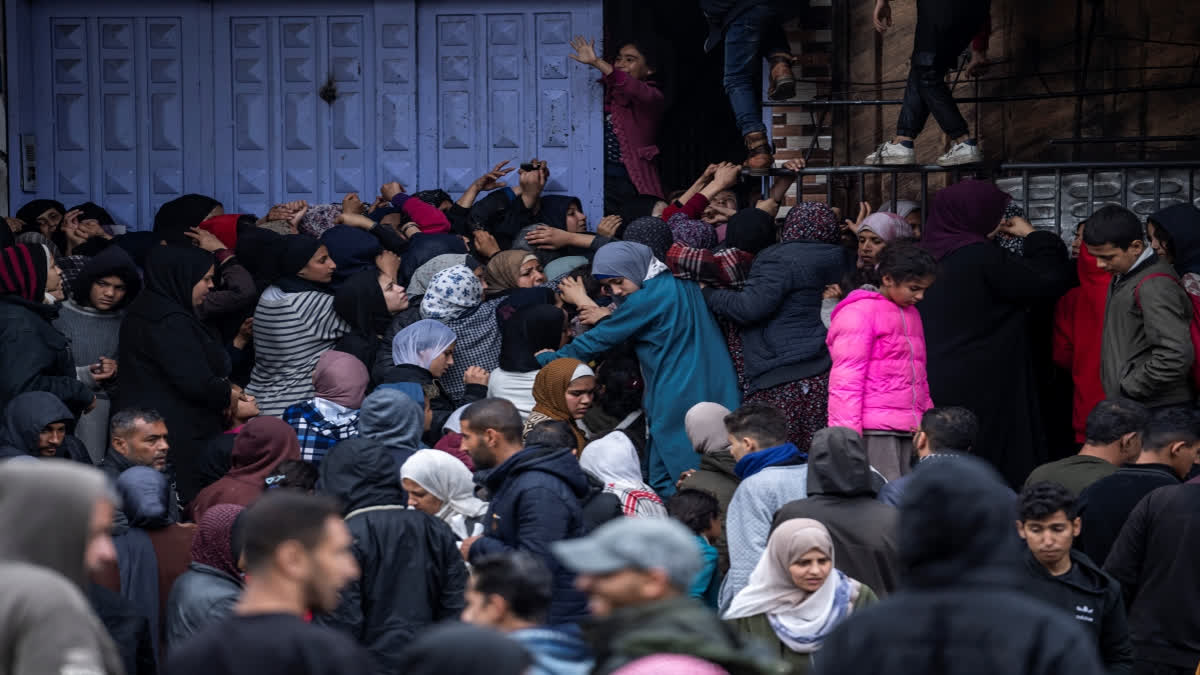Rafah:It’s not just Israeli bombs that have killed children in war-ravaged Gaza — now some are dying of hunger too. Officials have long warned over the risk of famine in the Palestinian territory that's been under Israel’s bombardment, offensives and siege for the past five months.
Hunger is most acute in northern Gaza, which has been isolated by Israeli forces and has suffered long cutoffs of food supply deliveries. At least 20 people have died from malnutrition and dehydration at the north’s Kamal Adwan and Shifa hospitals, according to the Health Ministry. Most of the dead are children — including ones as old as 15 — as well as a 72-year-old man.
Particularly vulnerable children are also beginning to succumb in the south, where access to aid is more regular. At the Emirati Hospital in Rafah, 16 premature babies have died of malnutrition-related causes over the past five weeks, one of the senior doctors told The Associated Press. “The child deaths we feared are here,” Adele Khodr, UNICEF’s Middle East chief, said in a statement earlier this week.
Malnutrition is generally slow to bring death, striking children and the elderly first. Other factors can play a role. Underfed mothers have difficulty breastfeeding children. Diarrheal diseases, rampant in Gaza due to lack of clean water and sanitation, leave many unable to retain any of the calories they ingest, said Anuradha Narayan, a UNICEF child nutrition expert. Malnutrition weakens immune systems, sometimes leading to death from other diseases.
Israel largely shut off entry of food, water, medicine and other supplies after launching its assault on Gaza following Hamas’ Oct. 7 attack on southern Israel — allowing only a trickle of aid trucks through two crossings in the south. Israel has blamed the burgeoning hunger in Gaza on U.N. agencies, saying they fail to distribute supplies piling up at Gaza crossings. UNRWA, the largest U.N. agency in Gaza, says Israel restricts some goods and imposes cumbersome inspections that slow entry.
Also, distribution within Gaza has been crippled, U.N. officials say convoys are regularly turned back by Israeli forces, the military often refuses safe passage amid fighting, and aid is snatched off trucks by hungry Palestinians on route to drop-off points. With alarm growing, Israel bent to U.S. and international pressure, saying this week it will open crossings for aid directly into northern Gaza and allow sea shipments.
DESPERATION IN THE NORTH
Conditions in the north, largely under Israeli control for months, have become desperate. Entire districts of Gaza City and surrounding areas have been reduced to rubble by Israeli forces. Still, hundreds of thousands of Palestinians remain.
Meat, milk, vegetables and fruit are nearly impossible to find, according to several residents who spoke to the AP. The few items in shops are random and sold at hugely inflated prices — mainly nuts, snacks and spices. People have taken barrels of chocolate from bakeries and are selling tiny smears of it.
Most people eat a weed that crops up in empty lots, known as “khubaiza.” Fatima Shaheen, a 70-year-old who lives with her two sons and their children in northern Gaza, said boiled khubaiza is her main meal, and her family has also ground up food meant for rabbits to use as flour. “We are dying for a piece of bread,” Shaheen said.
Qamar Ahmed said his 18-month-old daughter, Mira, eats mostly boiled weeds. “There is no food that suits her age,” said Ahmed, a researcher with Euro-Med Human Rights Monitor and an economic journalist. His 70-year-old father gives his own food to Ahmed’s young son, Oleyan. “We try to make him eat and he refuses,” Ahmed said of his father.
Mahmoud Shalaby, who lives in the Jabaliya refugee camp, said he saw a man in the market give a bag of potato chips to his two sons and tell them to make it last for breakfast and lunch. “Everyone know I has lost weight,” said Shalaby, the senior program manager for the aid group Medical Aid for Palestinians in northern Gaza.
